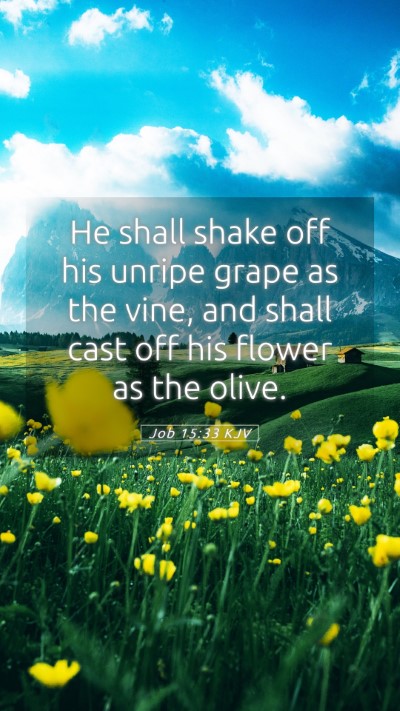Understanding Job 15:33
In this passage, Job's friend Eliphaz speaks to him, illustrating a profound commentary on the fate of the wicked and the perils of sin. Below, we delve into a comprehensive analysis of Job 15:33, offering insights from notable public domain commentaries to enhance your Bible study insights and enrich your Bible verse understanding.
Overview of Job 15:33
"He shall shake off his unripe grape, as the vine, and cast off his flower, as the olive." This metaphor is illustrative of the eviction of prosperity and vitality, commonly associated with the products of the vine and olive tree, representing blessings and fruits of a righteous life.
Interpretation and Commentary
-
Matthew Henry's Commentary
Henry suggests that Eliphaz portrays the ultimate removal of things that appear promising but are inherently flawed. The unripe grape signifies unrewarded efforts, as those who are ungodly may enjoy fleeting successes but ultimately face rejection.
-
Albert Barnes' Notes
Barnes notes that Eliphaz likens the sinner's fate to a vine that, despite having blossoms, ultimately bears no fruit. This analogy serves as a warning regarding the deceptive appearances of prosperity in sin. He clarifies that any seeming good leads to inevitable loss in the end, akin to the unripe grape falling from the vine.
-
Adam Clarke's Commentary
Clarke's analysis emphasizes the agricultural imagery used in the verse, representing a divine principle of judgement. He observes that as the flowers of the olive and grapes signify an early promise, they can also represent wasted potential when disregarded by the divine. This calls into question not just the actions of an individual but the entirety of their moral standing.
Significance of Job 15:33
The verse serves as a critical part of the discourse on justice within the book of Job, emphasizing that earthly appearances can often be misleading. The teaching unpacks the themes of Biblical exegesis centering on divine judgement and human accountability.
Key Themes
- Judgement and Accountability: The verse is profoundly tied to the Old Testament themes of justice. Eliphaz's speech reflects the beliefs of the time regarding retribution theology—that suffering is a direct result of sin.
- Illusion of Prosperity: The imagery signifies how the wicked may seem to thrive temporarily but will ultimately meet their demise, reflecting a divine ordering of the moral universe.
- Human Fragility: The comparison of human beings to unripe grapes communicates vulnerability and the unpredictability of life without faith and righteousness.
Applying Job 15:33 to Daily Life
For Bible study groups and individuals alike, the verse presents an opportunity for reflection on what constitutes true success and prosperity in life. It encourages believers to examine their lives for alignment with divine expectations rather than mere external appearances.
Cross References Related to Job 15:33
- Psalms 1:4-6: "The ungodly are not so: but are like the chaff which the wind driveth away."
- Proverbs 10:25: "As the whirlwind passeth, so is the wicked no more: but the righteous is an everlasting foundation."
- Isaiah 5:2: "And he fenced it, and gathered out the stones thereof, and planted it with the choicest vine..." This highlights the expectations for bearing good fruit.
Conclusion
In conclusion, Job 15:33 serves to provide deep theological insight into the nature of sin, divine justice, and the ephemeral nature of worldly success. By drawing from multiple Bible verse commentaries, we garner a richer understanding of Scripture that lays the foundation for authentic faith and life application. These explorations reveal the multilayered meaning of Bible verse interpretations, enhancing one's Bible verse explanations significantly.
This passage serves as a reminder that true worth does not lie in human definitions of success but in faithfulness and righteousness before God.


